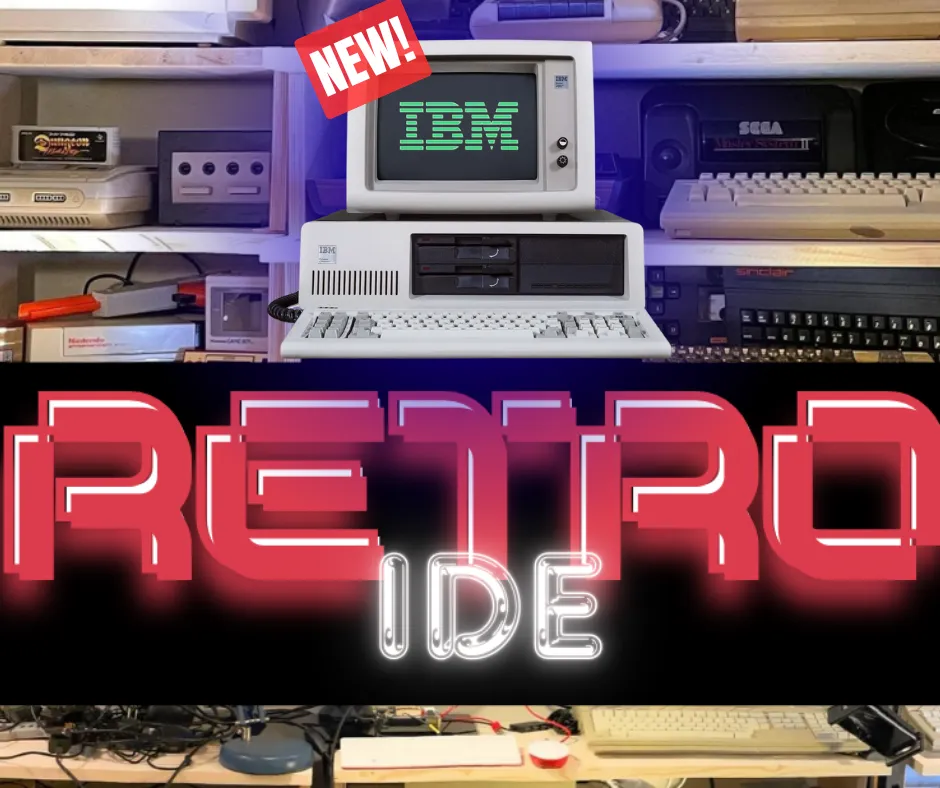
Yearn for the days of Turbo C, Turbo Pascal, QBasic, and x86 Assembler?
Yearn for the days of Turbo C, Turbo Pascal, QBasic, and x86 Assembler?
My web-based retro game development tool got some more updates recently, and I know it is easy to miss my announcements on the socials, so I thought I would write them up here.
The main addition, and the one most asked-for by the community, is there is now an Auto-compile on/off toggle to stop or allow the compiler to respond to your changes in the editor. When making substantial edits this could cause unnecessary re-compilations, so I prioritised this.
When auto-compile is in the off position, click the green ‘play’ button to compile and execute. In some systems, mainly those with hard disks, you might also need to reset/reboot first.

It did change some complex stuff under the hood for some systems, so let me know if you see issues!
Next up there is a brand new platform/target …
IBM PC/x86 DOSBox Platform and Emulation
IBM PC compatibles are still around so you might think of it as a strange one to include, especially as the IDE is dominated by 8-bit systems, but the MSDOS era was a huge part of computing history, and the 1990s was the era I entered the workforce so even if nobody else cares, I wanted these guys in!
I’m using JS-DOS, which is a JavaScript/WASM based full DOS experience, including an emulated hard disk. This means that I was able to include:
- Turbo C Compiler – Full Turbo C 2.01 development environment
- QBASIC Interpreter – Complete QBASIC development environment with graphics support
- Turbo Pascal Compiler – Full Turbo Pascal development environment with BGI graphics
- NASM Assembler – Netwide Assembler for x86 assembly programming with VGA graphics
- DOSBox Emulation – Complete DOS 6.22 environment with file system
Now, although DOSBox claims to bundle ANSI.sys interpretation, some of the ANSI codes don’t actually work (I have an example program listing included for you to test this), but the DOS/BIOS codes do work so you should not miss out too much on the DOS command line programming experience.
Other than that, the main thing to look out for is code runs a lot faster in your web browser than on the hardware of the day, so take that into account!
FreeDOS is also there as a platform, but it is less developed than the aforementioned option. It does, however, have Rogue hidden in a directory on the A: drive …
 DOS Rogue
DOS RogueBBC BASIC Update
- Large Listings – Before we were being limited by the amount of characters allowed on a URL because the basic text was being included as a parameter. Now the limit is the Beeb, which means BBC BASIC Star Trek! Also there were some idiosyncrasies being caused by web encoding combined with tokenization for downloads. No longer! Now, instead of using a tokenizer for exports, the IDE extracts tokenized BASIC directly from the running emulator memory.
- Disk image (.SSD) Export – Speaking of exports … If you download program on the BBC Micro now, rather than just the compiled binary file or raw tokenized .BAS, you get a .ssd disk file for use on a desktop emulator or for transfer to your real BBC Micro. A !BOOT file is included so the disk starts the program CHAIN"PROGRAM" automatically.
Star Trek.BAS
Auto-compile on/off toggle
There’s C64 and BBC Basic versions of Star Trek on there now, but I know there will be purists who want something closer to the original, so I couldn’t resist adding one more version, from May 16th, 1978 to be exact:
.png)





